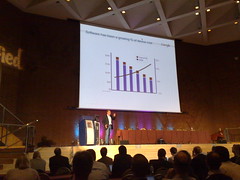Future of Mobile: Rich Miner, Google
 Future of Mobile: Rich Miner, Google
Future of Mobile: Rich Miner, Google
"Changing the mobile industry, one phone at a time"
Pre-iPhone, we saw the mobile industry as being closed. Unlimited data plans, browsing anywhere, installable apps... all moves towards openness, all difficult to reverse.
Every carrier in the US now has unlimited data plans: "carriers tend to behave like lemmings, when one starts in a particular direction the others follow behind"
iPhone pushed carriers to embrace someone else's brand on their network and be supportive of a model they couldn't directly monitise.
How bad could it have been? RM launched the first Windows Mobile SPV phone; didn't work that well, but showed promise. Orange was launching Push-To-Talk at the time, the SPV had a bug with PTT which MS were going to take 18 months to fix: derailing the launch. He worked for Orange Ventures, investing in applications and startups, but it still proved impossible for Orange to launch new products. Apps needed to be signed, tested, embedded. PMs of any threatened products derailed new ones.
The ability for consumers to connect directly to publishers (err... is it direct if it goes via Apple/G stores?) is a fix for this.
Mobile is the best distributed device, and in many cases the only connected device end-users own.
So it's important for Google. They found getting apps signed across many carriers troublesome. Constrained devices needed innovation to fix. Overall it was confusing to the developer and the end user.
As bill of materials cost for device falls, software has been a growing percentage of % of device cost: operating system, browser, codecs. There was no proprietary, open OS - and it felt bad for one entity to control any platform.
Simon from the Gears for Mobile team:
Lots of developers want to do quite simple things. On the desktop, between 2003 and 2006 there was a shift away from writing apps and towards mobile apps. GMail showed that the browser was capable of some interesting things. Google Maps showed nice draggable components.
 Mobile web apps suck for 3 reasons: latency in the network, poor access to local storage/caching, and lack of access to device capabilities (e.g. location).
Mobile web apps suck for 3 reasons: latency in the network, poor access to local storage/caching, and lack of access to device capabilities (e.g. location).
Gears was originally designed for enabling offline web apps on the desktop. Today in the Android browser, you can deliver LBS apps.
End piece: "no one party controls the platform (nor a committee)".
Apps are self-published. No human makes a judgement on apps to go out.
Q: In open source projects, usability tends to get left behind. How are you going to guide the UI of Android?
A: Most of the phones we carry today aren't open source; this doesn't mean they have good interfaces. TiVo is built on open source with a good UI. Most of the web is built on open source.
Q: (Claire Boonstra) iPhone had greater hype than the iPhone when it first came along.
Q: Open technology, but will Google control it in any way. As a developer can I replace the search engine or maps application?
A: You can build a handset with no Google apps.
Q: (David Wood) How will you ensure the applications written by developers run on different handsets, when the platform has been modified by handset vendors?
A: Despite Java's best efforts, there wasn't a reference implementation to judge them by: this is the difference with Android. So the chances for fragmentation are lower. And we'll introduce a conformance test for OEMS, and encourage carriers to run it. In the early days of PC Clones, you had the "Lotus 1-2-3" test - if it ran this, the clone worked. We'll pick reference apps that challenge the platform in a good way, and educate people that these matter.
Interesting, a different argument from the one I've heard before (which was that fragmentation won't happen because "it's not in our interest") - much more detailed, much more useful.
Q: In the current implementation of Android, developers can't create their own home-screen widgets. Why?
A: The home-screen is just an app. We ran out of time to get a widget architecture in there. It's a common request